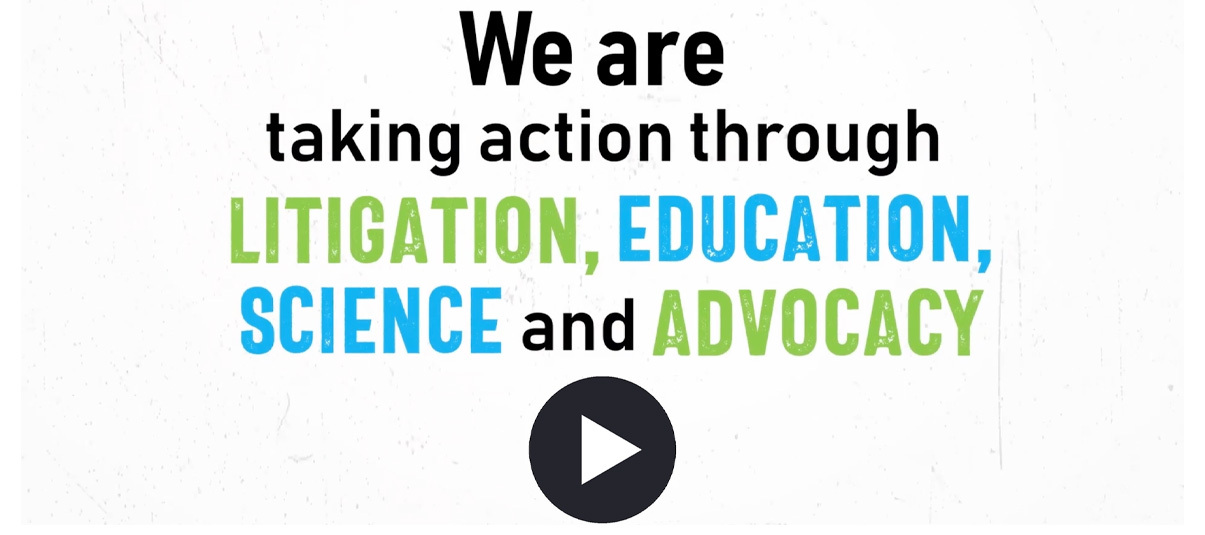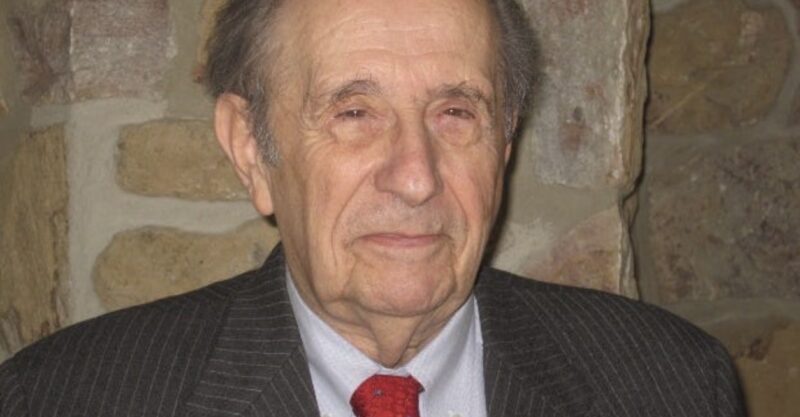Stanley Plotkin’s Deposition is Gold for RFK Jr.
NEW HOPE, Pennsylvania— I don’t know what Robert F. Kennedy Jr. and his team have planned for September, but the deposition of the architect of the modern vaccine program would be great place to start looking for clues.
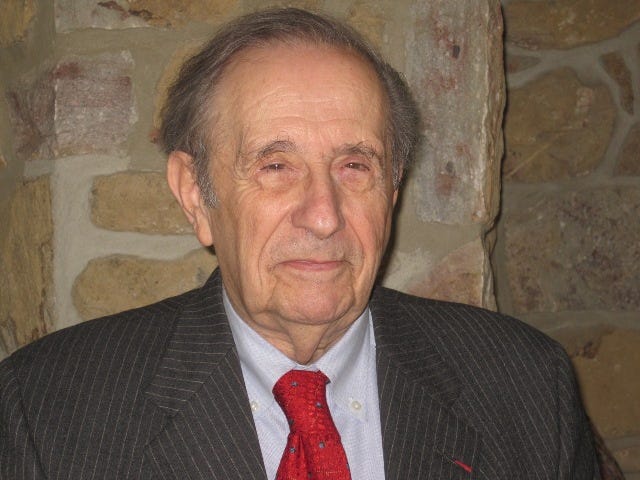
Dr. Stanley Plotkin is the godfather of the modern vaccine industry. Now 92 years old, he literally wrote the book on vaccines; called Plotkin’s Vaccines, it’s now in its seventh edition, and the textbook is recommended by Bill Gates as an “indispensable guide to the enhancement of the well-being of our world.” Even at his advanced age, in a recent, super creepy poll of the Top 50 “most influential people in vaccines,” Dr. Plotkin was voted #5 (Bill Gates was #1).
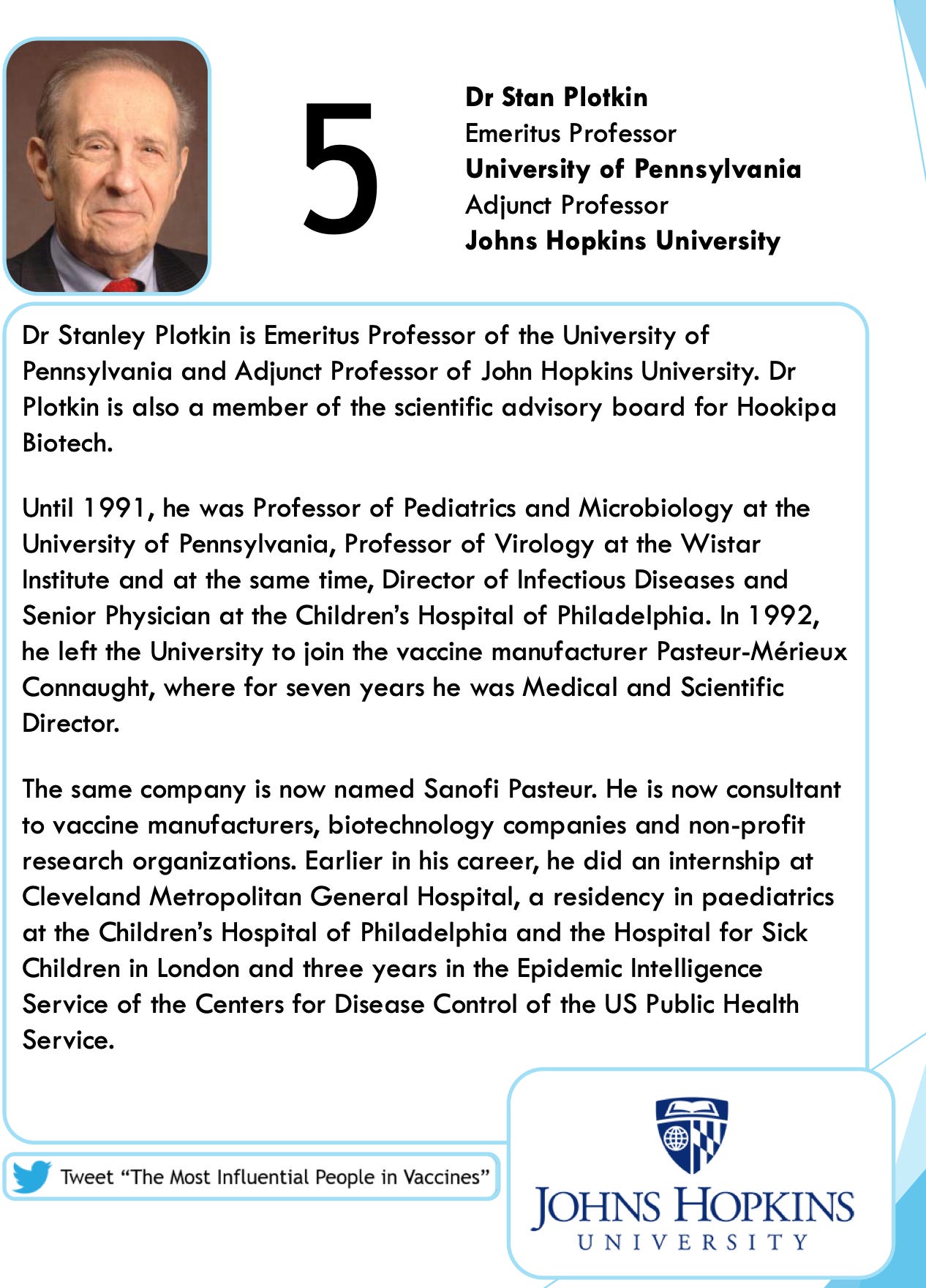
Dr. Plotkin’s intimate relationship with the vaccine industry knows no boundaries. He’s a vaccine inventor, company board member, peer reviewer, professor, and mentor of all things vaccines. The number of awards Dr. Plotkin has received for his service to vaccines is lengthy, including the French Legion of Honor, the Sabin Gold Medal, and the Maxwell Finland Award for Scientific Achievement.
Dr. Plotkin’s prize pupil, Dr. Paul Offit (ranked number six in the aforementioned poll), learned everything he knows about vaccines from Dr. Plotkin, and together they have shaped many of the talking points that govern the way vaccines are positioned to the public. They jointly shared in the riches of the development of the rotavirus vaccines, with each of them making a cool six million dollars when their invention was sold to Merck. In early January of 2018, Dr. Plotkin added another superlative to his resume: expert witness.
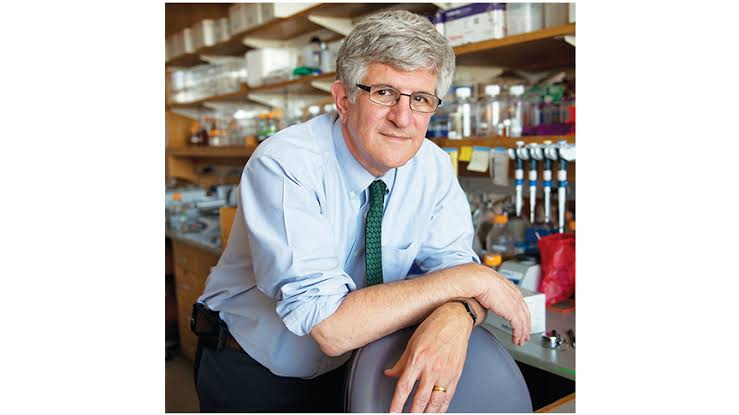
A custody battle in Michigan between Lori Matheson and her ex-husband Michael Schmitt included a disagreement over vaccines for their shared child. The mother didn’t want to vaccinate her daughter at all; the father did. With the case making national headlines, Dr. Offit got involved behind the scenes to support the father, along with the pharma-funded pro-vaccine nonprofit, Voices for Vaccines. Their big idea? Roll in Dr. Plotkin as the expert witness for the father. Who better to extoll the virtues of vaccination than the founder of the modern vaccine industry?
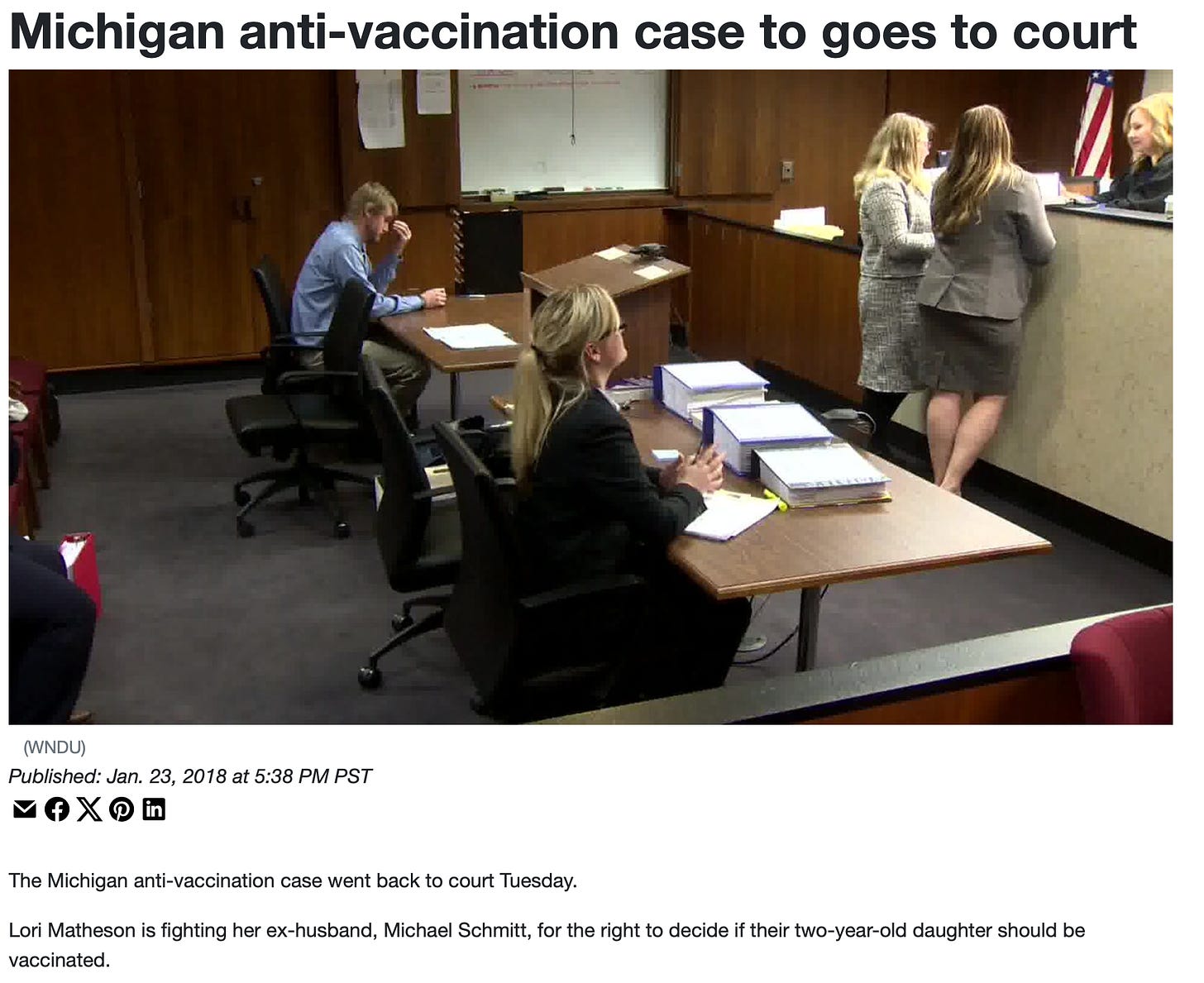
This would be a high-profile case, and Dr. Plotkin’s testimony could set precedent for how these matters are adjudicated in the future. This was the first time Dr. Plotkin had agreed to serve as an expert witness on the subject of vaccines. It was also the first time Dr. Plotkin would have to testify under oath in a wide-ranging deposition conducted by the attorney for the mother in the case, Aaron Siri. Anytime an “expert witness” is offered up in a trial, the opposing counsel has the right to depose that witness in advance of the trial, and Mr. Siri exercised his rights, deposing Dr. Plotkin on January 11, 2018, at a location near Dr. Plotkin’s megamansion in New Hope, Pennsylvania.
The deposition lasted eight hours. The next morning, January 12, Dr. Plotkin recused himself from being an expert witness in the case.
In between, Mr. Siri exposed more truth about vaccines and the vaccine industry in one document than had ever been done in the previous 100 years!

It’s Never about the Money
Vaccine industry marketers have a unique ability to rationalize away any implication that there might be a profit motive behind their behavior. Dr. Offit in particular bemoans any hint that his motivations aren’t pure:
But the part that hurts the most is the continued claim that we did this for the money. I don’t know any scientist who does it for the money (you certainly don’t make much in salary). You do it because it’s fun and because you think you can contribute. And the reward for creating a vaccine was also never financial.
Dr. Offit is discussing the six million dollars that he claims he received (other public estimates have been far higher) when a patent for the rotavirus vaccine for which he was a coinventor was sold to Merck. Unlike Dr. Offit, there are many people concerned that financial conflicts heavily impact vaccine policy making, so much so that the US Congress’s Committee on Government Reform issued a blistering report on the very topic, entitled “Conflicts of Interest in Vaccine Policy Making.” The conclusion was a stern rebuke:
The Committee’s investigation has determined that conflict of interest rules employed by the FDA and the CDC have been weak, enforcement has been lax, and committee members with substantial ties to pharmaceutical companies have been given waivers to participate in committee proceedings.
Interestingly, the report was particularly critical of a doctor who served on a decision-making committee affiliated with CDC: Dr. Paul Offit. When a predecessor rotavirus vaccine was added to the recommended vaccine schedule in the United States, Dr. Offit voted in favor of adding it (while his own vaccine was still under development), but when that same vaccine was shown to be causing a high rate of a deadly bowel affliction, Dr. Offit abstained from supporting the vaccine’s removal from the market (it was later removed). In an excellent investigation titled “Voting Himself Rich,” the late, great Dan Olmsted and Mark Blaxill criticized Dr. Offit’s “use of his former position on the CDC’s Advisory Committee on Immunization Practices to help create the market for rotavirus vaccine—to effectively vote himself rich.”
As you’re about to read, Dr. Plotkin equally considers himself to be above the fray, despite his gargantuan financial conflicts of interest. Sure, he takes millions of dollars from the vaccine industry, but that has nothing to do with the things he says about vaccines. Yeah, right!
The Plotkin Deposition
As a bespectacled Dr. Plotkin sat for his deposition wearing a dark suit and red tie, he had no idea his opposing counsel was one of the most informed people in the world on the topic of vaccines. A UC Berkeley School of Law honors graduate and former clerk for the Israeli Supreme Court, Mr. Siri is not your average lawyer. In 2015 Mr. Siri made headlines when he successfully defeated a flu shot mandate for children that had been imposed on citizens of New York City.
At the time Mr. Siri explained that “parents across the city who, in consultation with their doctors, made the decision that the risks outweighed the benefits for their particular child, had that right taken away from them by 11 unelected individuals sitting in the Board of Health right across the street.”
Mr. Siri’s cross-examination skills are formidable, and reading the deposition for the first time was one of the more satisfying moments in my time as an autism activist. The opposing lawyer representing Dr. Plotkin was severely outmatched, and I had to laugh that this was the brainchild of Dr. Offit. Did he not realize Dr. Plotkin would be deposed? Mr. Siri understood every trick, exaggeration, misstatement, and controversy, and he walked Dr. Plotkin into bear trap after bear trap the way Tom Cruise brought Jack Nicholson along in A Few Good Men, which is the movie I kept thinking of as I read the deposition. And watching the video of the deposition, I saw Dr. Plotkin grow more and more annoyed as the deposition progressed. I kept waiting for him to scream, “You can’t handle the truth!” At least for now, the entire 9-hour affair sits on YouTube, you can watch it right here:
Dr. Plotkin, along with Dr. Offit, has shaped many of the false narratives about vaccines that permeate our culture. From their perch at the Children’s Hospital of Philadelphia, Drs. Plotkin and Offit are the go-to resource for any mainstream journalist writing about vaccines. Vaccines rarely harm, testing is thorough, they never cause autism, every child needs them, herd immunity must be maintained. All of these false narratives and exaggerations can trace their origins to Drs. Plotkin and Offit. But none of them has ever had to endure the scrutiny of being challenged under oath.
It’s as close as we will ever get to deposing the vaccine industry itself, and it was a colossal blunder to allow Dr. Plotkin to be deposed, which he seemed to realize within the first hour of the deposition. It’s hard to do a four-hundred-page document justice in one blog post, particularly because in many cases Mr. Siri would lead Dr. Plotkin down a lengthy path before exposing the lies or contradictions to his testimony, but I’ll do my best. At the very least, I hope this will show you some of the ways the vaccine industry exaggerates, spins, and lies when the facts about vaccines don’t suit their needs.
Conflicts of Interest
Mr. Siri opened by reminding Dr. Plotkin that he was testifying under “penalty of perjury” for any false statements, and Dr. Plotkin stated that his last deposition had been sometime in the 1960s but that he was “willing to help in this case.” Mr. Siri then took Dr. Plotkin through his extensive travel schedule for 2017, at the end of which Dr. Plotkin confirmed that “probably about half” of the trips were sponsored by “companies developing vaccines.”
Dr. Plotkin was asked if he knows the name, the age, and the vaccination status or has reviewed the medical records of the daughter of the parents involved in the court case. “I do not know” was the answer provided to every detail. Mr. Siri walked Dr. Plotkin through the name of every vaccine recommended by the CDC and asked Dr. Plotkin if the daughter in the case should receive the vaccine. Of course, Dr. Plotkin’s answer was always yes. Mr. Siri established, with Dr. Plotkin’s help, that “every vaccine that you [Dr. Plotkin] believe [daughter] should receive is produced by either Merck, Sanofi, GSK, or Pfizer, correct?”
Mr. Siri was then able to establish that Dr. Plotkin had received payments from these four vaccine manufacturers for at least the last thirty years, and that the dollar amounts are in the millions. Dr. Plotkin explained, “I’m sure it’s a sizable amount of money.” He further explained, “I’ve consulted for essentially all of the major manufacturers. I do not know how much I received. But I have certainly received payments from Merck, from Glaxo, from Pfizer, and many other entities.”
Of course, it’s no crime to consult to vaccine makers, or become a multimillionaire from doing so—it’s Dr. Plotkin’s job. It compromises your role as an expert witness, however. Mr. Siri quickly dug down into a pattern: nondisclosure and conflict. Mr. Siri first focused on a nonprofit organization that Dr. Plotkin was a “driving force” in creating, Voices for Vaccines. Dr. Plotkin asserted that the organization, a pro-vaccine advocacy organization, “receives no funding from any of the pharmaceutical companies, and that is on order to avoid any suggestion of a conflict of interest.” It sounds like a line Dr. Plotkin has stated many times, and Mr. Siri then produced a tax return for Voices for Vaccines, showing support for the organization provided by the Task Force for Global Health, an industry-funded organization. Dr. Plotkin admitted that he “stands corrected.”
Dr. Plotkin grew annoyed at all the questions about the money he has received from vaccine makers. The exchange is very telling:
MR. SIRI: You’re here today opining that [daughter] should receive vaccines that are made by the big four pharmaceutical companies, correct?
DR. PLOTKIN: I am, yes.
MR. SIRI: Okay. And you didn’t anticipate that your financial dealings with those companies would be relevant in that issue?
DR. PLOTKIN: I guess, no, I did not perceive that that was relevant to my opinion as to whether a child should receive vaccines. Vaccines have to be made by somebody. And, of course, in this world they’re made by pharmaceutical companies who make profits on vaccines. And the fact that they make profits on vaccines has no bearing on whether those vaccines are good for a child or not.
MR. SIRI: So you think the fact that pharmaceutical companies make money on vaccines doesn’t bias how they approach the promotion of their own products?
DR. PLOTKIN: I imagine it biases them in favor of vaccines, but so does most of the scientific world.
Dr. Plotkin let Mr. Siri know that he “resent[s] very much the line of questioning that suggests that what I believe and what I’ve done have been done for financial reasons.” He repeated the mantra from Dr. Offit above that “none of the things that I’ve done have been done for financial gain,” even as Mr. Siri made it clear that Dr. Plotkin is a millionaire many times over because of his support of the vaccine industry.
In a crescendo to the conflict of interest questioning by Mr. Siri, we learned that Dr. Plotkin has a two-hundred-page resume, has been an author or coauthor of 794 published scientific studies, and is on the faculty of thirteen separate universities, his reach and influence perhaps unprecedented. But Dr. Plotkin’s resume is also missing many critical details, including the names of all the vaccine makers who are currently paying him, as Mr. Siri pointed out:
So in providing this CV to your, to defendant’s counsel, you didn’t think disclosing your affiliations with the very companies whose product you’re saying [daughter] should receive, her pediatrician purchase and provide to her, was necessary to disclose?
Later Mr. Siri highlighted a 2011 report from the Institute of Medicine in which Dr. Plotkin was listed as one of the reviewers of the published study. Mr. Siri noted that Dr. Plotkin only has “University of Pennsylvania” next to his name. “It doesn’t disclose that at that time you were working for all four of the major vaccine makers, correct?” Dr. Plotkin responded: “No.”
Mr. Siri then walked Dr. Plotkin through more than a dozen private biotech companies—all developers of vaccines—where Dr. Plotkin served as a compensated board member. None of his affiliations have been disclosed anywhere. Finally, Mr. Siri quoted the New England Journal of Medicine, which Dr. Plotkin had already affirmed is a highly credible journal:
Let me read you a different quote, again, by Dr. Angell [of the NEJM] in which she blames the issue with truths in medical publishing, on individuals that use legitimacy of academia to push pharmaceutical company agendas. Here’s what she said about those individuals. She says, “They serve as consultants to the same companies whose products they evaluate, join corporate advisory boards and speakers bureaus, enter into patent and royalty arrangements, agree to be the listed authors of articles ghostwritten by interested companies, promote drugs and devices at company-sponsored symposia, and allow themselves be plied with expensive gifts and trips to luxurious settings. Many also have equity interest in sponsoring companies.”
The whole time, Mr. Siri had been using this quote to establish Dr. Plotkin’s pattern of behavior. It was clear to everyone in the room that Dr. Plotkin can check every box on the list of an editorial written by the editor of the prestigious New England Journal of Medicine on why it is no longer possible to believe clinical research, as pharmaceutical companies have so thoroughly co-opted experts. It’s clear that Dr. Plotkin is the poster child for this phenomenon. Painstakingly, Mr. Siri asked Dr. Plotkin questions about each of these ways that “experts” are co-opted:
“You consulted for the big four vaccine makers?”
“You’re on the corporate advisory board of numerous vaccine developers, yes?”
“You have received royalties from the sale of one or more vaccines, correct?”
“You are listed as an author on at least one or more papers where individuals authoring papers receive compensation from vaccine makers, correct?”
“And you’ve taken numerous trips over the last 30 years to various parts of the world?”
Dr. Plotkin feebly answered “yes” to each question, the steam almost visibly rising from his head. And there we see, as clearly as you ever will, how thoroughly compromised people who purport to be disinterested parties really are when it comes to vaccines. How can people reaping millions from vaccine makers be the “expert witnesses” on the product?
Gardasil, Merck, and Data Manipulation
Earlier, Mr. Siri had established clearly that none of the vaccines for children were tested with a group of children who received an “inert placebo,” making any conclusions drawn about side effects nearly impossible to corroborate. Dr. Plotkin was forced to agree. For Gardasil (the HPV vaccine), a different problem took place. There were actually three groups used during testing. One group received the vaccine. One group received a shot that only contained aluminum adjuvant, and one group received a true placebo, a shot of saline. The latter two groups (aluminum and saline), however, were combined when the data was reported, making it impossible to know if the true placebo group had a lower rate of adverse events than either Gardasil or the aluminum adjuvant.
Painstakingly, Mr. Siri took Dr. Plotkin through this extraordinary abuse of data. Overall, the Gardasil trial showed that 2.3 percent of the women who received either the vaccine or the combined aluminum/saline developed a systemic autoimmune condition within six months. Mr. Siri explained to Dr. Plotkin, and got him to confirm, that the saline group, had it been reported separately, actually had an adverse event rate of zero. “And then if we had a third column that was just the saline placebo, it would show 0 percent? . . . Wouldn’t that have been a significant finding to report?”
Dr. Plotkin had no real answer: “I don’t—you’d have to ask a statistician.”
It’s a remarkable exchange. Mr. Siri had just highlighted an extreme abuse of trust and data manipulation by Merck, Dr. Plotkin’s primary benefactor.
Double Standards in Vaccine Testing
Mr. Siri then caught Dr. Plotkin in an extreme contradiction. He asked him about a recent study done by Dr. Peter Aaby in which Dr. Aaby looked at the impact of DTP vaccine in Africa and concluded the vaccine did more harm than good. Dr. Plotkin was familiar with the study, respected Dr. Aaby, but was dismissive of the findings, because Dr. Aaby “doesn’t have randomly vaccinated or children who randomly receive pertussis vaccine or don’t receive pertussis vaccine. . . . But in the absence of random administration, you don’t know for sure whether it’s the vaccine or other factors that are operating.”
None of the licensed vaccines for children ever receive this sort of rigorous testing, and placebos are never used, as Mr. Siri quickly established. He also had Dr. Plotkin confirm how long the observation period is for vaccine trials and showed him a number of package inserts from the vaccines themselves.
Mr. Siri started with the hepatitis B vaccine. “How long does it say that safety was monitored after each dose?” Begrudgingly, Dr. Plotkin responded, “Five days.” But, Mr. Siri wondered, is that “long enough to detect an autoimmune issue that arises after five days?” Dr. Plotkin stated the obvious: “No.” Mr. Siri then asked, “Was there any control group in this trial?” Dr. Plotkin, who had just argued how important control groups are to cause and effect, was forced to answer truthfully, “It does not mention any control group, no.”
Drilling down on the hepatitis B vaccine, Mr. Siri pulled out a different insert for a different hepatitis B vaccine that show safety testing only took place for four days after administration. Dr. Plotkin confirmed the duration but stated, “I am willing to bet that they did collect reactions after four days.” Mr. Siri pressed, since no documentation supported Dr. Plotkin’s bet, and he was forced to admit it was “speculation.” Apparently, rigorous testing is critical when finding fault with vaccines, but not when licensing them for use in millions of children.
This was such a revealing back and forth. Dr. Plotkin seemed genuinely surprised by how short the observation period was for vaccines; he was sure they must have done more monitoring later, but of course that would have been explained in the package insert, and it wasn’t. Vaccine proponents lie about the “rigorous testing” vaccines have endured, but when you press them, they often point to how “safe” vaccines are that are already in use. In reality, we are dramatically underreporting vaccine injury, as Mr. Siri explained to Dr. Plotkin next.
As a quick aside, Aaron Siri and the Informed Consent Action Network have forced our government, through many FOIA lawsuits, to admit that testing for the childhood schedule is non-existent. Check out this extraordinary chart.
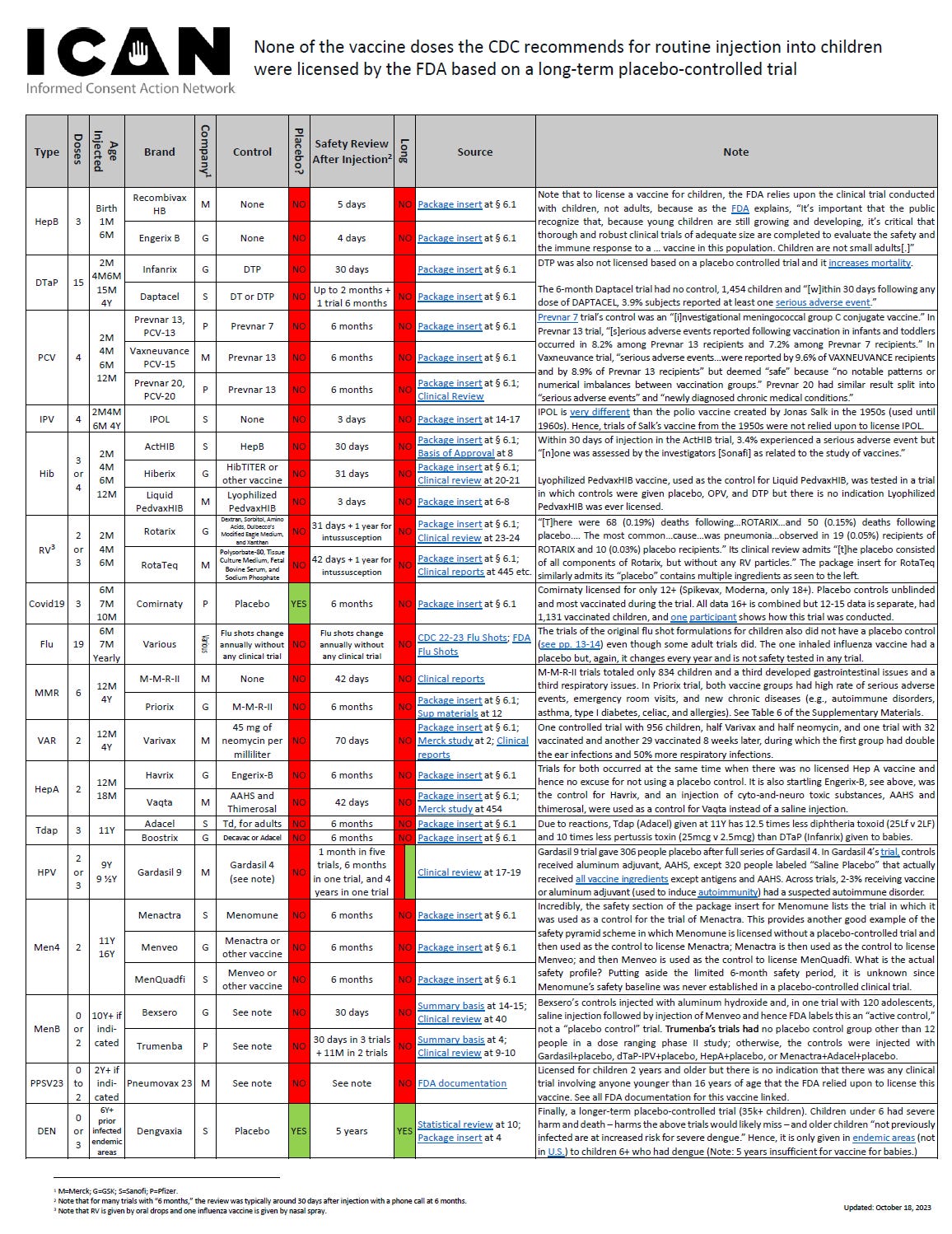
Incomplete VAERS Data
MR. SIRI: Isn’t it true that VAERS only receives a tiny fraction of the reportable adverse events after vaccination?
DR. PLOTKIN: Well, I can’t give you a percentage, but all physicians are asked to report putative reactions to the VAERS system. So I don’t think the VAERS system covers a tiny portion of alleged reactions. I think, rather, probably most are reported.
Mr. Siri produced a study commissioned by HHS and run by Harvard Pilgrim. He showed Dr. Plotkin where the study says, “Fewer than 1 percent of vaccine adverse events are reported.” He asked Dr. Plotkin to read it.
MR. SIRI: Okay, so this study says that less than 1 percent of adverse events are reported to VAERS, right?
DR. PLOTKIN: Well, I have to check that, but I think that’s correct.
I probably let out my largest laugh during this exchange. Dr. Plotkin had the nerve to say that “probably most” vaccine reactions are reported. This is the mindset of a vaccine developer who believes vaccines are always “safe and effective,” no matter what the data says. It feels fanatical, really. He is one of the foremost experts on vaccines in the world, and he believes VAERS is capturing most vaccine injuries; simply unbelievable!
The Inadequate Pertussis Vaccine
The reason there are guaranteed whooping cough (pertussis) outbreaks in the United States every year is that the vaccine for pertussis is pretty ineffective. Dr. Plotkin confirmed this:
MR. SIRI: How long does the current immunity last from the current acellular pertussis vaccine?
DR. PLOTKIN: Well, it lasts for probably on the order of five years, but the efficacy diminishes after two years or so. And the result is that there have been more pertussis in adolescents than we would like.
Mr. Siri was also able to establish that the vaccine for pertussis—DTaP—doesn’t prevent people from being a carrier of whooping cough to others:
MR. SIRI: Does the cellular pertussis vaccine prevent the infection and transmission of pertussis in the person vaccinated with acellular pertussis vaccine?
DR. PLOTKIN: It appears that the acellular vaccines don’t protect the individual from carrying the organism as much as the so-called whole-cell pertussis vaccines did. . . . But there is a concern that the acellular vaccines may not protect an individual from passing the organism to another individual even if the vaccinated person doesn’t get sick himself or herself.
I think very few people understand how inadequate this vaccine really is; it was nice for Dr. Plotkin to admit it. As I’ve said before, people often have this cartoonishly simple view of a vaccine: You get the shot; now you’re immune—presto! It rarely works that way, and the explanation of DTaP’s limitations makes that clear.
Experimenting on Marginalized and Vulnerable People
Mr. Siri brought up a topic that Dr. Plotkin did his best to avoid. He asked, “Have you ever used orphans to study an experimental vaccine?” Dr. Plotkin responded, “Yes.” Mr. Siri then asked a horrifying question: “Have you ever used the mentally handicapped to study an experimental vaccine?” Dr. Plotkin does his best to evade the question:
DR. PLOTKIN: I don’t recollect ever doing studies in mentally handicapped individuals. At the time in the 1960s, it was not an uncommon practice.
MR. SIRI: So you’re saying—I’m not clear on your answer. I’m sorry. Have you ever used mentally handicapped to study an experimental vaccine?
DR. PLOTKIN: What I’m saying is I don’t recall specifically having done that, but that in the 1960s, it was not unusual to do that. And I wouldn’t deny that I may have done so.
MR. SIRI: Well, there’s an article entitled “Attenuation of RA 27/3 Rubella Virus in WI-38 Human Diploid Cells.” Are you familiar with that article?
DR. PLOTKIN: Yes.
MR. SIRI: In that article, one of the things it says is 13 seronegative mentally retarded children were given RA 27/3 vaccine?
DR. PLOTKIN: Okay. Well, then that’s, in that case that’s what I did.
MR. SIRI: Have you ever expressed that it’s better to perform experiments on those less likely to be able to contribute to society, such as children with handicap, than with children without or adults without handicaps?
DR. PLOTKIN: I don’t remember specifically, but it’s possible.
MR. SIRI: Do you remember ever writing to the editor of “Ethics on Human Experimentation”?
DR. PLOTKIN: I don’t remember specifically, but I may well have.
MR. SIRI: I’m going to hand you what’s been marked as Exhibit 43. Do you recognize this letter you wrote to the editor?
DR. PLOTKIN: Yes.
MR. SIRI: Did you write this letter?
DR. PLOTKIN: Yes.
MR. SIRI: Is one of the things you wrote: “The question is whether we are to have experiments performed on fully functioning adults and on children who are potentially contributors to society or to perform initial studies in children and adults who are human in form but not in social potential?”
DR. PLOTKIN: Yes.
MR. SIRI: Have you ever used babies of mothers in prison to study an experimental vaccine?
DR. PLOTKIN: Yes.
MR. SIRI: Have you ever used individuals under colonial rule to study an experimental vaccine?
DR. PLOTKIN: Yes.
I need to take a deep breath before I comment on this. My grandfather was adopted. My son is “mentally handicapped.” I’m going to refrain from moralizing; feel free to draw your own conclusions. I’ll just make two points: One, if you have “mentally handicapped” people as your test subjects, how will you know if the vaccine causes mental problems? Two, I think this shows you what the vaccine industry has always known: Vaccines are really dangerous. So when you test them on the populations that are the most hidden from society, and have the least power to complain, you can bury any disasters. It’s profoundly depraved thinking. I’ll just remind you that this doctor, and his medical ethics, built the modern vaccine industry.
Dismissal of Religious Objections
In the majority of states in the United States, you can object to receiving a vaccine for religious reasons. Dr. Plotkin and his protégé, Dr. Paul Offit, have spearheaded talking points to combat these religious exemptions, arguing that biblical texts were written before the invention of vaccines, and that a parent denying a child vaccination on religious grounds is flying in the face of science and medicine that are “data-based systems, not beliefs.” Of course, they rely on their interpretation of vaccine injury data to make this argument. Mr. Siri pressed Dr. Plotking on his thinking:
MR. SIRI: Do you believe that someone can have a valid religious objection to refusing a vaccine?
DR. PLOTKIN: No.
MR. SIRI: Do you take issue with religious beliefs?
DR. PLOTKIN: Yes.
MR. SIRI: You have said that, “Vaccination is always under attack by religious zealots who believe that the will of God includes death and disease”?
DR. PLOTKIN: Yes.
MR. SIRI: You stand by that statement?
DR. PLOTKIN: I absolutely do.
MR. SIRI: Are you an atheist?
DR. PLOTKIN: Yes.
MR. SIRI: Do you accept that some people hold religious beliefs that are inherently unprovable?
DR. PLOTKIN: Yes, I’m sure they do.
Dr. Offit, in consultation with Dr. Plotkin, has publicly been pushing this line of thinking quite a bit. Basically, they are saying, “There’s no such thing as a religious objection to a vaccine.” It’s pretty crazy; the United States is founded on the idea that people cannot be compelled to do things that violate their beliefs. Dr. Plotkin doesn’t think that way. Once again, it feels fanatical and intolerant, but that’s just my opinion.
Doublespeak
Later, Mr. Siri discussed a 2011 Institute of Medicine report on vaccine safety. He read the report to Dr. Plotkin, summarizing, “so the IOM concluded of the 135 most commonly claimed injuries for vaccination, it didn’t know whether or not the vaccines caused that.” At this point, one of the more revealing exchanges takes place between Dr. Plotkin and Mr. Siri:
MR. SIRI: You know, you earlier stated that, you stated that hepatitis B is, doesn’t cause encephalitis, right?
DR. PLOTKIN: That’s, that’s my opinion, yes.
MR. SIRI: But the IOM, after doing its review, determined it couldn’t find science to support a causal determination one way or another, correct?
DR. PLOTKIN: Yes. But that means that they don’t have evidence for the supposition.
MR. SIRI: That it either causes or doesn’t cause?
DR. PLOTKIN: Right.
MR. SIRI: They don’t know?
DR. PLOTKIN: They don’t know because there aren’t enough data.
MR. SIRI: Okay. But you have—
DR. PLOTKIN: In the absence of data, my conclusion is that there are no, there’s no proof that causation exists.
MR. SIRI: So if there’s no data to show that it causes or doesn’t cause—
DR. PLOTKIN: Yes.
MR. SIRI: —your supposition is that—am I understanding that correctly?
DR. PLOTKIN: Yes.
MR. SIRI: Is that it doesn’t cause it?
DR. PLOTKIN: That there’s no proof that it does.
MR. SIRI: Okay. That’s different than saying it doesn’t cause it, correct?
DR. PLOTKIN: Correct.
MR. SIRI: So when you were saying earlier when I asked you at the beginning of this whether certain vaccines caused certain conditions and you said, no, they don’t, did you just mean that, no, there’s not enough evidence to make a decision one way or another?
DR. PLOTKIN: I mean that there’s no knowledge known to me that they do certain things that are, that some may have alleged happen after vaccination.
MR. SIRI: Like, for example, you know, the IOM reviewed whether hepatitis B can cause lupus because of lots of reports or influenza can cause lupus. They concluded that there’s insufficient evidence one way or another to make a determination. You indicated—
DR. PLOTKIN: Right.
MR. SIRI: But you indicated earlier that those vaccines don’t cause lupus. Your testimony, you’re saying that you said no because you weren’t aware of a mechanism by which it could cause it; is that right?
DR. PLOTKIN: Yes. That’s correct.
MR. SIRI: Okay. But the science really isn’t available to make a determination on causation yet, right?
DR. PLOTKIN: The science doesn’t show that there is a relationship.
This hairsplitting by vaccine proponents drives me nuts. The Institute of Medicine report Mr. Siri is referring to makes three conclusions: Vaccines do cause certain side effects, they don’t cause certain other side effects, and for certain side effects, we don’t know whether they do because the work hasn’t been done yet to find out, despite the fact that these side effects have been reported to the VAERS database. In Dr. Plotkin’s world if the work hasn’t been done, that means the vaccine doesn’t cause it. It’s crazy thinking, and not the kind of thinking any other prescription drug could survive, but in Dr. Plotkin’s world, vaccines are innocent until proven guilty, so much so that an absence of data means the vaccines doesn’t cause it—vaccines always get the benefit of the doubt.
DTaP, Autism, and the Burden of Proof
In reviewing the 2011 study from the Institute of Medicine, Mr. Siri asked Dr. Plotkin if he recollects what the IOM’s conclusion was about whether DTaP vaccine can cause autism. Dr. Plotkin replied, “I’d have to look that up, but I feel confident that they do not cause autism.”
Mr. Siri found the IOM’s actual conclusion and had Dr. Plotkin read it: “The evidence is inadequate to accept or reject a causal relationship between diphtheria toxoid-, tetanus toxoid-, or the acellular pertussis-containing vaccine in autism.” Mr. Siri pressed Dr. Plotkin:
So the IOM reviewed the available evidence with regard to whether Tdap or DTaP can cause autism, and their conclusion was the evidence doesn’t exist to show whether DTaP or Tdap do or do not cause autism, correct?
At this point Mr. Siri made mincemeat of the oft-repeated claim by so many that “vaccines do not cause autism”:
MR. SIRI: But since, Dr. Plotkin, we don’t know whether DTaP or Tdap cause autism, right, it would be a bit premature to make the unequivocal, sweeping statement that vaccines do not cause autism, correct?
DR. PLOTKIN: In the absence of evidence, one should not draw any conclusions except that there’s no evidence. And so I don’t infer from the absence of evidence about a million different things that they’re necessarily true. One has to do studies to determine whether or not a phenomenon exists, and usually those studies are done because there’s some suspicion that, of a relationship. But in, we have no suspicions, at least I don’t, that autism is caused by DTaP.
MR. SIRI: Well, you may not have that suspicion, but it is one of the most commonly reported conditions, adverse events, which is why it was reviewed in this IOM report from DTaP/Tdap, which we discussed earlier. So I just, I’m not saying, I’m not asking you to say that vaccines do cause autism. I’m not asking that at all. I’m asking you, as a scientist, can you make the statement that vaccines do not cause autism if you don’t know whether DTaP or Tdap cause autism?
DR. PLOTKIN: As a scientist, I would say that I do not have evidence one way or the other.
MR. SIRI: And so for that reason, you’re okay with telling the parent that DTaP/Tdap does not cause autism even though the science isn’t there yet to support that claim?
DR. PLOTKIN: Absolutely.
This exchange was so revealing for me. In fact, I only gave you the heart of it; it actually went on for many pages. Dr. Plotkin thinks it’s okay to say, “Vaccines don’t cause autism,” even as the IOM has clearly said that with DTaP they don’t have evidence either way. Why is it okay? Because in Dr. Plotkin’s world, vaccines will never cause autism, because if they did his world as he knows it would basically end. The last exchange pushed me over the edge. Dr. Plotkin was more than happy to tell a parent DTaP doesn’t cause autism, even though the IOM said evidence was “inadequate” to make any conclusion at all.
Immune Activation Is the Objective of Vaccines
One of the many extraordinary admissions that Dr. Plotkin provided concerns the relationship between vaccines and “immune activation,” a topic I recently wrote an extensive blog post about, as new science is demonstrating that immune activation events—largely triggered by man-made aluminum adjuvant— are the primary cause of autism.
MR. SIRI: This is from California Institute [of Technology], CalTech. That institution did a number of studies regarding—that group did a number of studies relating to immune activation and neurological disorder, correct?
DR. PLOTKIN: Yes.
MR. SIRI: And they found a connection between immune activation and neurological historical disorders, correct?
DR. PLOTKIN: Yes.
MR. SIRI: Okay. And one of the study’s findings they had was that immune activation alters fetal brain development through interleukin-6, correct?
DR. PLOTKIN: As I said before, IL-6 is an important cytokine. I would point out in relation to immune activation, that immune activation occurs as a result of disease and exposure to a variety of stimuli, not just vaccines.
MR. SIRI: But it can be caused by vaccines, correct?
DR. PLOTKIN: Immune activation is the objective of vaccines.
When I first read Dr. Plotkin’s testimony above, I gasped out loud. I know, if you’re relatively new to this topic, you may be scratching your head: “What’s the big deal?”
The big deal is that science has converged, and it’s converged on autism’s causation: autism is caused by immune activation events, something vaccines are designed to trigger.
After reading a transcript of the deposition, and then watching the 9 hour video, I was struck with the following thoughts:
Dr. Plotkin appears sociopathic. The definition of the word is “lacks a sense of moral responsibility or social conscience.” I’m not sure what else to call someone who runs vaccine trials on orphans, the mentally disabled, and babies of moms in prison and then pens an op-ed justifying using the mentally ill for medical trials. It’s deeply disturbing thinking, and this is the man who has guided the vaccine industry’s ideology for fifty years. He’s also intolerant of anyone who may have a genuine religious objection to vaccines.
Dr. Plotkin employs scientific standards only when convenient. The DTP study in Africa doesn’t meet his standards of science for having placebo controls, but vaccine safety trials do, despite having no controls and only monitoring adverse reactions for a few days. The Gardasil trial that hid its placebo numbers? You’ll have to ask the statistician. I’ve seen this from so many pro-vaccine spokespeople—they will criticize any studies that question vaccine safety but never acknowledge the paucity of safety studies.
Dr. Plotkin is blind to the scale of vaccine injury. The exchange in which Dr. Plotkin figured the deeply flawed VAERS system captures most vaccine injury was revealing. He doesn’t care about vaccine injury—the ends always justify the means. He’s wrong about vaccine injury by at least a factor of one hundred times (because only 1 percent of vaccine injury is captured by VAERS). How could he not know that? A study by CDC authors who Dr. Plotkin knows well identified that perhaps 1% of most adverse events are reported. Because knowing that is inconsistent with his worldview: Vaccines are safe, no matter what the data says.
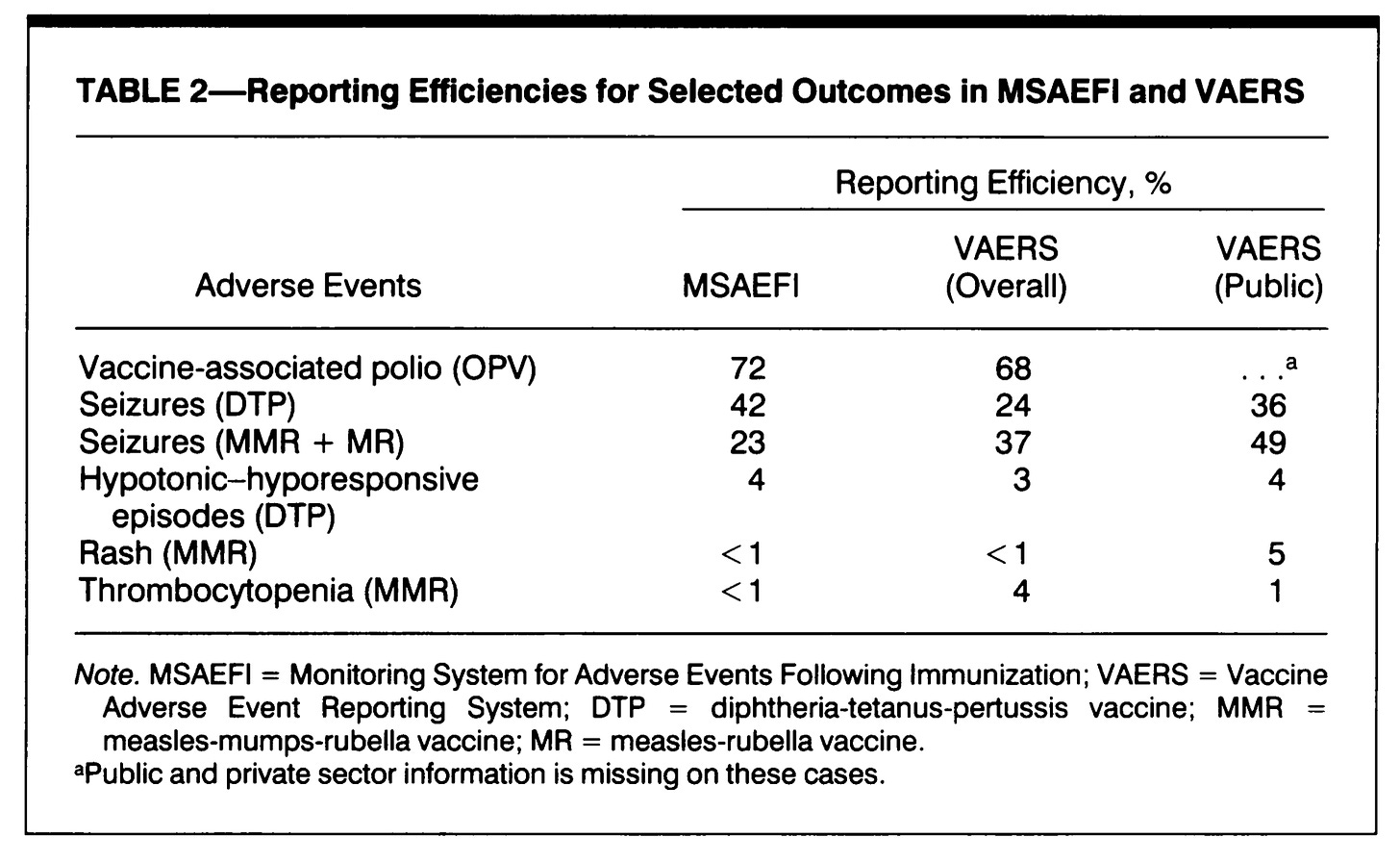
Dr. Plotkin will never cross the autism line. It’s clear from how long Dr. Plotkin spends fighting Mr. Siri about the fact that the IOM stated that the data can neither prove nor deny a relationship between DTaP vaccine and autism that there is no world where Dr. Plotkin will acknowledge something that has become obvious to many. The mainstream has been denying the vaccine-autism link for so long—spearheaded by Drs. Plotkin and Offit—that admitting the connection at this point would probably be too much to bear.
Dr. Plotkin’s flawed thinking is the vaccine industry’s flawed thinking: Don’t acknowledge vaccine injury. Don’t acknowledge the weakness of safety studies. Employ scientific standards only when convenient. Never admit autism is connected to vaccines. Vaccines are always “safe and effective,” no matter what the data says.
The Tobacco Playbook
In November 1998 a Master Settlement Agreement was reached between tobacco companies and attorneys general from forty-six states. Tobacco companies were finally accountable for at least some of the damage cigarettes had caused. But the first science implicating tobacco was a mouse study published in 1953 in which scientists demonstrated, clearly and unequivocally, that cigarette tar caused cancer. The penalty of the settlement was $206 billion.
What did US District Judge Gladys E. Kessler find the tobacco companies guilty of? “Conspiracy.”Ever heard that word before used against autism parents?
It took forty-five years for a reckoning because right after the mice study, to actively muddy the waters, tobacco companies formed the “Tobacco Industry Research Committee” so they could challenge all scientific evidence implicating tobacco. The organization provided hundreds of millions of dollars of funding for research at many of the leading institutions in the country that could sow doubt about the tobacco-cancer link. Producing “distracting research” that would sow endless doubt about a fast-emerging certainty became their primary goal. Committee members met with the leadership of every major newspaper, magazine, and television network, explaining their intent to fund a “research program devoted primarily to the public interest,” which was really a euphemism for research that would exonerate tobacco, or at least muddy the scientific waters and generate as much doubt as possible about the link between smoking and lung cancer.
Naomi Oreskes and Erik Conway, in their best-selling book Merchants of Doubt, explained how Big Tobacco exploited the vulnerabilities of science to their advantage, creating doubt at every turn in the road and effectively extending the industry’s reckoning by four decades:
By the late 1950s, mounting experimental and epidemiological data linked tobacco with cancer—which is why the industry took action to oppose it. In private, executives acknowledged this evidence. In hindsight it is fair to say—and science historians have said—that the link was already established beyond a reasonable doubt. Certainly no one could honestly say that science showed that smoking was safe. But science involves many details, many of which remained unclear, such as why some smokers get lung cancer and others do not.
What if I told you that the only “Big” bigger than Big Tobacco was back in their heyday is today’s Big Pharma, the very industry that makes all these vaccines? Big Pharma, one of the largest purchasers of advertisements in mainstream media, and Big Pharma, the industry that spends the most on lobbying, is the reason this fight about autism is taking so long. Don’t believe me? From 1998 to 2009 the CDC was run by Dr. Julie Gerberding, where she presided over a massive expansion in the number of vaccines given to children and a massive explosion in the number of autism cases in the United States. Where did Dr. Gerberding go after resigning from the CDC? To serve as president of the vaccine division of Merck, the largest “Big Pharma” company in the world and the market leader in vaccines. This is not an easy battle.

Let me remind you that the market for vaccines is expected to be worth $88 billion in 2025, up from $170 million in the early 1980s. Let me say that again. In the 1980s, with no childhood epidemics to speak of, the market for vaccinations was worth $170 million. Fast forward, and the market for vaccines has grown 400 times larger! In the 1960s the vaccine schedule in the United States called for three vaccines for childhood; today, it’s thirty-eight (that’s not a typo)—a more than twelvefold increase in the number of vaccines given to children.
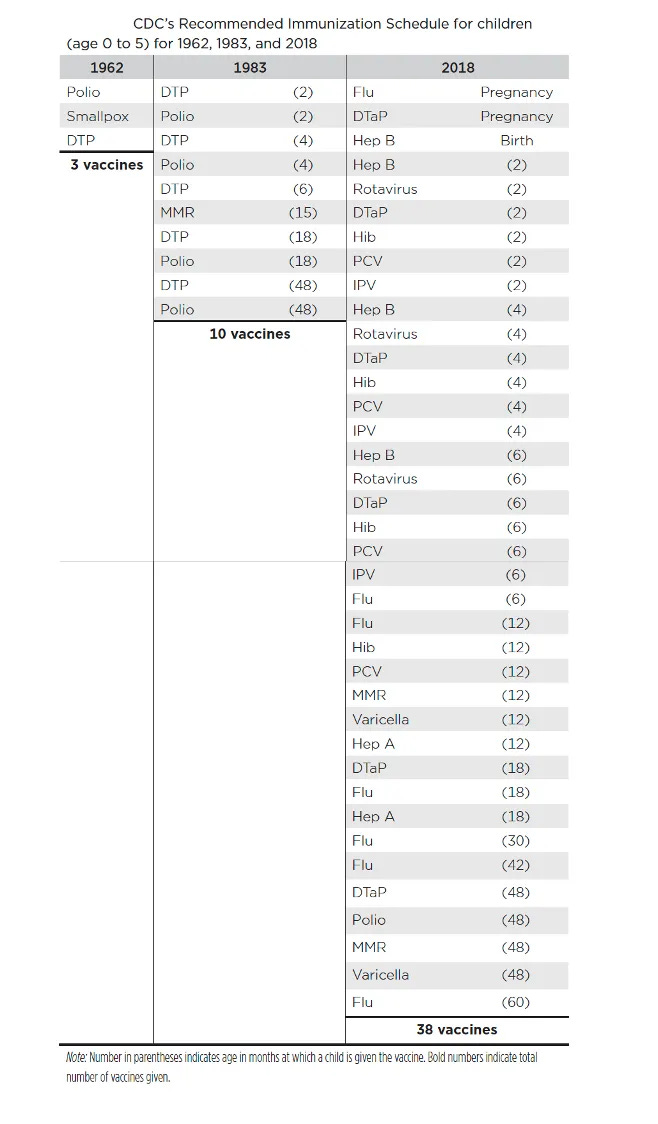
Autism is Tobacco 2.0, with manufactured doubt cast on every new discovery from determined parents, doctors, and scientists. Just like tobacco, we even have mice studies that show precisely how a vaccine can cause autism in the brain of a newborn. This evidence of “biological plausibility,” now appearing in multiple scientific studies published since 2010, represents a tipping point for truth. History may not repeat, but it certainly rhymes.
People are fond of characterizing autism as “complex,” but that obscures the simple explanation for what has happened to so many children, and why. In the 1970s the rate of autism was documented to be just under one in ten thousand children. Today one in thirty-six kids has autism—that’s roughly 1.8 million school-age (four to seventeen) American children.
This also means there are 277 times more kids with autism today than there were thirty years ago. That’s a gain of almost 30,000 percent! An epidemic this severe has to have a simple explanation, just as the lung cancer epidemic had a simple explanation, too.
The Tobacco Playbook is being expertly utilized by Big Pharma and their paid supporters—it almost seems like the very same PR firms and law firms that helped Big Tobacco are now helping Big Pharma . . . because they are. Literally. At the same time, it’s astonishing how many people already know the truth about the autism epidemic and what’s happening to our kids. Hundreds of scientists, thousands of doctors, and tens of thousands of parents, all saying the same thing. Heck, there’s the camera man on Larry King Live, the makeup person on the set of The Doctors, the wife of the famous radio host, the Time Magazine reporter who just can’t tell the truth for fear of reprisal, or the board member at Autism Speaks, so many people know the truth (all these examples are people who directly confided in me, as if I’m some sort of high priest of autism confessionals!) In fact, surveys show fully one-third of Americans today feel vaccines and autism are linked.
Attempts to dismiss people who “believe” vaccines cause autism as some sort of minuscule movement are not supported by the facts; hundreds of millions share my view and that of my wife.
In retrospect, it seems unbelievable that it took people more than forty years to convincingly prove that inhaling hot tar multiple times a day would trigger lung cancer, but that’s exactly what happened. The CEOs of all seven Big Tobacco companies stood before Congress, swearing to tell the truth, and then said (with a straight face, no less) that cigarettes were not addictive, nor was it clear that they were causing lung cancer. I remember the TV broadcast. It’s an image I have never been able to shake. That congressional hearing took place in 1994, a full four years before the Master Settlement Agreement.

Perhaps not surprisingly, the very same strategies used to keep the tobacco debate alive have been employed in the debates about links between DDT and the loss of ecosystems, lead paint and children’s IQs, coal and acid rain, asbestos and mesothelioma, CFCs and the ozone hole, Vioxx and heart attacks, and fossil fuels and global warming (to name just a tiny fraction of examples). This movie has been shown so many times before that I suppose it’s harder to see it clearly in the moment. But the patterns are clearly established. Here’s what we know about how corporations will behave in the face of mounting scientific evidence proving their product is causing harm:
1. Science will be utilized to manufacture doubt and manipulate the media and the public. This includes funding new science and paying experts to support the safety of a product causing harm. This strategy was created and mastered by Big Tobacco and now, as I’ve mentioned, even has a name: The Tobacco Playbook.
2. Public relations firms will make a fortune from these deep-pocketed clients, and their job will be to meet with and alert members of the media on their client’s sponsored science while refuting any science from the opposing side. This job is always easier if the industry causing harm is a large buyer of television, print, and other paid media. (The Tobacco Industry Research Committee was actually run by a PR firm, Hill & Knowlton.) From TobaccoTactics, here’s some more about Hill & Knowlton:
Hill and Knowlton were commissioned by the major tobacco companies of the time in 1953 to regain public confidence in the tobacco industry following the revelation by the medical profession that smoking was damaging to health.
John W, Hill, Hill and Knowlton’s president at the time, said that denying the facts would not be enough as this would clearly be borne from self-interest. Instead, demanding more science was a better tactic. He suggested that the goal of the tobacco industry should be to build and broadcast a major scientific controversy which would convey the message that the health effects of smoking were not conclusively known. One way to achieve this end was to commission more research into the causes of illness. Hill proposed the creation of a research group which would serve a public relations purpose demonstrating the tobacco industry’s collective concern for the public. The Tobacco Industry Research Committee was founded. In an advert published in more than 400 newspapers across the United States, tobacco companies promised to explore the science of tobacco and to ensure consumer well-being.
Brandt claims in his paper that it was at this time that Doubt and Uncertainty became ‘the industry’s collective new mantra’. This is now a well-rehearsed tactic that persists to the present day.
3. Aggressive, expensive paid lobbying of politicians at the state and federal level. Donations to politicians supporting industry views will rise. Where possible, lobbyists will write and promote laws supportive of the product, dismissive of health concerns, and protective of future liability. Their paid politicians will present and pass these laws, like Dr. Richard Pan, a California state senator who has created many laws to eliminate vaccine choice in children.

4. Finally, real science will prevail. The truth will come out. And consumers will learn that the product in question causes harm, like the aforementioned mice study. This science will usually be hard to fund, condemned, and ruthlessly attacked, until enough courageous scientists publish the same information over and over again. Regulatory agencies will grudgingly respond. Few will see jail time, if any.
When the profits are big enough, corporations will do what they were formed to do: protect profits. This ruthless strategy continues today. Autism is arguably the most vicious, cruel, and dismissive battle yet, the new autism rate happened to be published today and its now 1 in 31, and 8% of boys in California. With so much at stake—money, careers, reputations—what happens when someone, somewhere speaks up and challenges the house of cards? Talk to me in September.
About the author

J.B. Handley is the proud father of a child with Autism. He spent his career in the private equity industry and received his undergraduate degree with honors from Stanford University. His first book, How to End the Autism Epidemic, was published in September 2018. The book has sold more than 75,000 copies, was an NPD Bookscan and Publisher’s Weekly Bestseller, broke the Top 40 on Amazon, and has more than 1,000 Five-star reviews. Mr. Handley and his nonspeaking son are also the authors of Underestimated: An Autism Miracle and co-produced the film SPELLERS, available now on YouTube.
